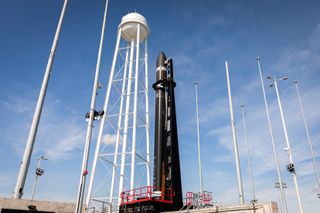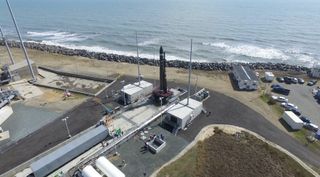Rocket Lab tests Electron booster on new Virginia launch pad for 1st time

Rocket Lab has rolled out its Electron rocket to the company's new Virginia launch pad for the first time and aced a number of tests ahead of their first U.S. launch, which is scheduled for late 2020.
The space technology company's new pad, called Launch Complex 2, is located at the Mid-Atlantic Regional Spaceport at NASA's Wallops Flight Facility on Wallops Island. The Rocket Lab team completed a short static-fire test with the rocket's nine first-stage engines and also completed tests to verify that all systems on the rocket and on the ground at the launch site were integrated correctly, the company said in an April 29 statement.
Rocket Lab also raised the Electron rocket to vertical on the pad, and completed power and communication checks.
Related: Rocket Lab and its Electron booster (photos)
These tests were successfully completed ahead of the company's first U.S. launch, which slipped from the second quarter of 2020 and is now set to take place "no earlier than the third quarter of 2020," the company said in the same statement. This launch, which will be coordinated by the U.S. Space Force's Space and Missile Systems Center, will loft a micro-satellite from the Air Force Research Laboratory's Monolith program.
"We're proud to be partnering with the U.S. Space Force for the first mission from Launch Complex 2 and we're honored to be working with them again following previous STP [Solar Terrestrial Probes - missions that study the sun and Earth] missions out of Launch Complex 1," Peter Beck, Rocket Lab founder and chief executive, said in the statement. "For more than two years, Rocket Lab has been providing responsive, dedicated and reliable access to space for government missions, and now we're proud to be building on that strong heritage with our first mission from the United States."

One of the reasons why Rocket Lab delayed this launch was delayed is because they wanted to have its autonomous flight termination system (AFTS), an automated system that controls launch range, certified by NASA. This launch will be the first to use an AFTS at Wallops. In the statement, Rocket Lab said in the statement that the company expects NASA to complete the certification in time for the launch.
Get the Space.com Newsletter
Breaking space news, the latest updates on rocket launches, skywatching events and more!
Rocket Lab clarified in the statement that their activities are continuing within the guidelines of the statewide order issued in Virginia which has closed all non-essential businesses. They added that they continue to maintain only critical infrastructure on-site and only essential on-site work is performed.
- What's next for Rocket Lab? A Q&A with CEO Peter Beck
- Rocket Lab launches satellite for US spysat agency
- Rocket Lab's 'Rosie' the robot can build a booster in just 12 hours
Follow Chelsea Gohd on Twitter @chelsea_gohd. Follow us on Twitter @Spacedotcom and on Facebook.
<a href="https://www.space.com/your-favorite-magazines-space-science-deal-discount.html" data-link-merchant="space.com"" target="_blank">OFFER: Save 45% on 'All About Space' 'How it Works' and 'All About History'!
For a limited time, you can take out a digital subscription to any of <a href="https://www.space.com/your-favorite-magazines-space-science-deal-discount.html" data-link-merchant="space.com"" data-link-merchant="space.com"" target="_blank">our best-selling science magazines for just $2.38 per month, or 45% off the standard price for the first three months.
Join our Space Forums to keep talking space on the latest missions, night sky and more! And if you have a news tip, correction or comment, let us know at: community@space.com.

Chelsea “Foxanne” Gohd joined Space.com in 2018 and is now a Senior Writer, writing about everything from climate change to planetary science and human spaceflight in both articles and on-camera in videos. With a degree in Public Health and biological sciences, Chelsea has written and worked for institutions including the American Museum of Natural History, Scientific American, Discover Magazine Blog, Astronomy Magazine and Live Science. When not writing, editing or filming something space-y, Chelsea "Foxanne" Gohd is writing music and performing as Foxanne, even launching a song to space in 2021 with Inspiration4. You can follow her on Twitter @chelsea_gohd and @foxannemusic.

